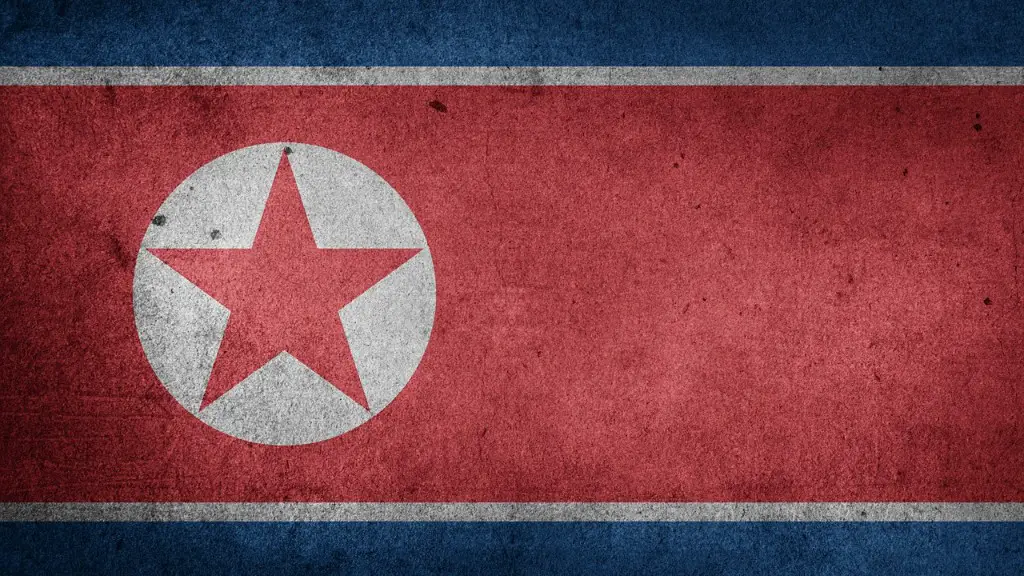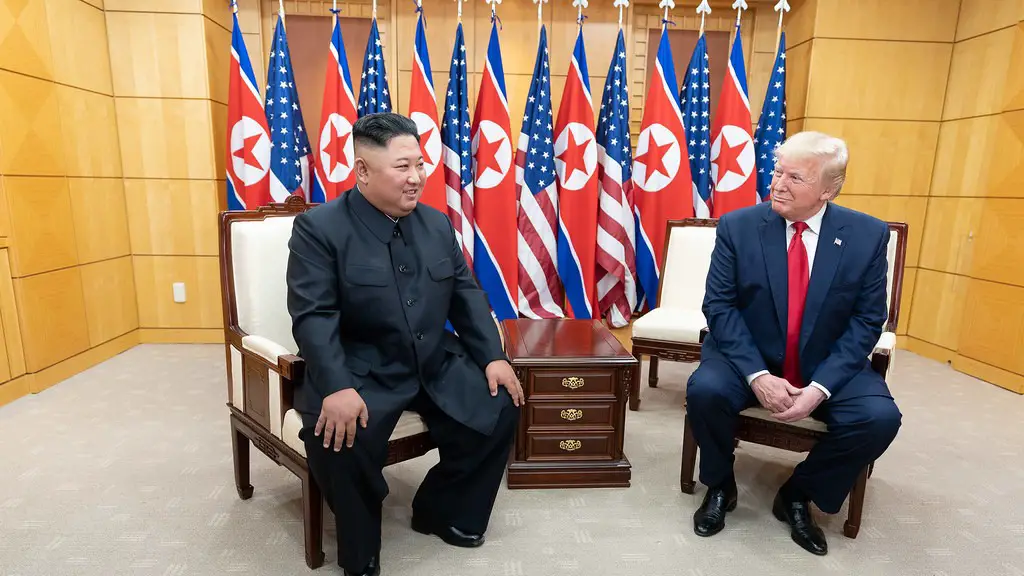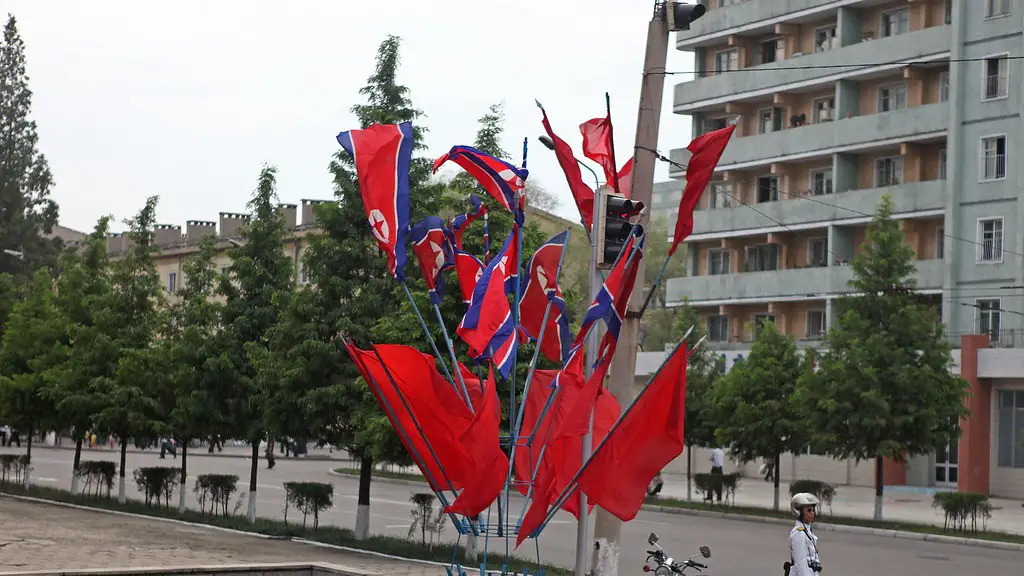North Korea is known for its militant stance and uncompromising approach to dissension. The country is ruled by an authoritarian regime, headed by Kim Jong Un, and has little tolerance for criticism or dissenters. It is a highly militarized country which frequently demonizes its perceived enemies, with South Korea and the US two of its primary targets. But who does North Korea actually hate the most?
Historical Hatred
Historically, North Korea has had a strained relationship with its neighbour South Korea and the US. The Korean War of 1950-53 drove a wedge between the communist North and capitalist South, and relations have been tense ever since. In recent times, the US is seen by North Korea as the enemy due to its hard-line stance towards the dictatorship, having imposed sanctions in response to North Korean nuclear and missile provocations. But it is South Korea that North Korea abhors the most, primarily due to its continued opposition to the North’s nuclear ambitions and its close ties with the US.
In 2016, the North sought to stoke fear in the South by firing a submarine-launched ballistic missile, demonstrating its capability of hitting the country. In 2017, North Korea threatened further aggression, leading South Korean president, Moon Jae-in, to pledge a strong response. North Korea also frequently threatens South Korean media outlets and journalists, resulting in a climate of fear and censorship.
Economic Desperation
North Korea is economically isolated and impoverished, relying heavily on foreign aid for its material needs. This has caused great resentment and frustration within the country, leading to an increased antipathy towards its perceived enemies. Furthermore, the country is highly dependent on China for trade, with up to 90% of its trade accounted for by China. This dependence has resulted in economic threats from the US, which have been met with vehement opposition from the North.
US sanctions, imposed in retaliation for the North’s nuclear and missile provocations, have severely affected the country’s already fragile economy. The North has responded by intensifying its rhetoric, but this has been met largely with international condemnation. The sanctions are deemed to be futile, given the North’s determination to acquiresources of nuclear weaponry and its clear disregard for international law.
Nuclear Posturing
Since the start of Kim Jong Un’s reign, North Korea has become increasingly aggressive in its rhetoric and military posturing, in particular towards the US. Kim has repeatedly tested nuclear warheads and ballistic missiles, despite warnings from the US and the United Nations. This has been seen as a direct threat to the US and its allies, as well as a major breach of international law. The US has responded by increasing its military pressure on the North and tightening economic sanctions.
The US and South Korea have also maintained a presence on the Korean peninsula to counter any potential threats from the North. This has further antagonized Pyongyang, leading to further threats and accusations of provocation against the US. In 2018, the US and South Korea unilaterally suspended all military exercises in an attempt to deescalate tensions and prevent any potential conflict.
Media Warfare
North Korea also uses its state-controlled media to demonize its perceived enemies, including the US. The media identifies the US as North Korea’s primary enemy, often accusing it of violating international law and of attempting to destroy North Korea’s nuclear programme. This rhetoric has been widely denounced by the international community as incendiary, potentially dangerous and inflammatory.
The media also serves to boost the cult of personality around Kim Jong Un, maintaining the North Korean leadership’s control over the population. It is also used to attack South Korea and its political leaders, as well as Japan, in an attempt to maintain the North’s stance as an isolated state.
Organic Outrage
There is also a genuine rage within North Korea at its perceived enemies, with the US in particular being seen as a major threat to the country’s sovereignty and security. This perceived hostility is deeply ingrained into North Korean society and is often used as a tool of political manipulation. This has been seen in anti-US rallies in Pyongyang, with citizens being encouraged to show their loyalty to the North Korean regime.
The North also has strong ties to China, with free-trade agreements helping to prop up the North’s fragile economy. Despite this, there is still a great deal of distrust and animosity towards the US and its allies. There have been reports of North Koreans expressing their anger and frustration towards the US, with some even stating that it is their goal to bring about an end to US rule.
Western Worries
The US and its western allies are wary of North Korea’s increasing belligerence and anger towards them, as well as its nuclear ambitions. Tensions between the US and the North remain high and could potentially lead to further military conflict. The US is also concerned that North Korea may be seeking to develop a nuclear arsenal to use as leverage in negotiations, or to threaten its perceived enemies.
The US has made attempts to deescalate the situation, but so far these have been largely unsuccessful. The North continues to oppose any concessions made by the US and has made it clear that it will only accept complete denuclearisation if it is guaranteed security and its sovereignty is respected.
Recognising Regional Rivals
The North’s hatred for its neighbours South Korea and the US remains intense, despite recent efforts to promote peace and conciliation. Pyongyang views both countries as its primary enemies, seeking to spread its power and influence by any means possible. Despite China’s attempts to mediate between the two countries, North Korea remains steadfast in its determination to maintain its supremacy and regime.
Relations have improved in recent years thanks to diplomatic efforts by the US and South Korea, but the North’s animosity towards the US and South Korea persists. This animosity is likely to remain for the foreseeable future and must be carefully managed to ensure that tensions do not lead to further military conflict.
A Vicious Cycle of Hostility
North Korea’s hatred of the US and South Korea is deeply entrenched, and has been further entrenched by years of hostile rhetoric and threats of aggression. The North is determined to maintain its sovereignty and power, and will continue to oppose any attempts to undermine its leadership. The US and South Korea must remain vigilant and continue to seek peaceful paths to resolution.
The situation remains highly volatile and complex. North Korea’s dependence on China for economic support further complicates the situation, as does its nuclear ambitions. The US and its allies must remain aware of the danger of conflict and the need to protect peace in the region.
Effects of Propaganda
North Korea’s state-controlled media is used to propagate the notion that the US and South Korea are the primary enemies of the country. This has been immensely effective in stoking anti-American and anti-South Korean sentiment within the country. This hostility has been further fuelled by economic sanctions and military posturing from the US and its allies. North Korea’s leadership has also used this sentiment to strengthen its grip on power.
However, the North Korean people remain largely apathetic towards their leaders’ threats towards the US and South Korea, with many viewing them as empty words. This suggests that the propaganda may be less effective than the North Korean leadership believes. That said, there is still a level of genuine hostility and opposition towards the US and South Korea, and this must be carefully managed to ensure stability in the region.
Repercussions of External Pressure
North Korea’s hatred for the US and South Korea is further fuelled by economic sanctions imposed by the US and its allies. This has had a severe impact on the already fragile economy, leading to increased resentment towards the US and its allies. This has further entrenched North Korea’s hostility towards the US and South Korea, and is likely to remain so in the future.
In addition, the US and South Korea have maintained a military presence on the Korean peninsula to counter any potential threats from the North. This has been seen as a provocative move by the North, further stoking its anger and hostility towards the US and South Korea. This is likely to have serious repercussions in the future and must be carefully managed by the international community.
Declines to Détente
Despite the North’s continued hostility and aggression, there has been some progress in recent times. US President Donald Trump has taken a more conciliatory approach towards the North, engaging in diplomatic talks and attempting to deescalate tensions. This has been met with some success, with North Korea suspending nuclear testing and making some concessions regarding its nuclear programme.
However, this goodwill has been met with skepticism by some, who suspect that North Korea may simply be using its conciliatory approach as a way to buy time. It remains to be seen whether North Korea will truly commit to a peaceful solution or whether it is simply biding its time until it can further its own agenda.
The North’s hatred of the US and South Korea is longstanding, and despite attempts to reduce tensions the animosity still persists. Moving forward, the US and its allies must continue to seek peaceful solutions and remain vigilant in the face of North Korea’s hostility.





